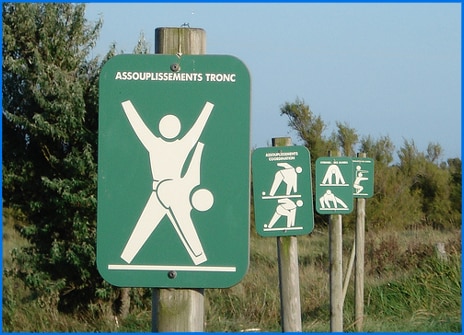
Does anything work to prevent childhood obesity? Once it has taken hold, can anything pull a child loose from its clutches? As many thousands of years as humans have been on earth, you’d think we would have figured this thing out by now. What kind of nurture does a growing human need so that the requirement for nurture can be satiated, while at the same time the process does not turn into a pathological need and the substance does not turn into an idol?
Nobody seems to know quite what to do; or rather, some people do know what to do, but have neither the authority or nor the power to make everybody else do it. That, of course, is a mixed blessing. Meanwhile, on the prosaic, everyday level of the public schools and the communities, various approaches are tried in different places. We talked about the whole family program 5-2-1-0 being implemented in Portland, Maine.
Another example of a whole family involvement is happening in Eagle, Idaho. News of this comes from Anne Wallace Allen via the Associated Press. It’s called Youth Engaged in Activities for Health, or YEah!, and is described as a free pilot program to help kids from 6 to 16. YEah! has been operating for less than a year. The concept is a multi-pronged approach designed to help prevent childhood obesity by changing behaviors on many levels.
It started as the collective brainchild of several professionals who habitually met for their morning run. Stacy Beeson is a dietician who accompanies a family to the supermarket to demonstrate healthful and economical shopping. A physical therapist and an exercise therapist are participants. Allen says,
A social worker counsels families on reasons why children overeat — such as boredom or for comfort — and advises parents on helpful ways to talk to kids about their weight… Kids in the YEah! program exercise together with exercise specialist Maria Covey once a week at a YMCA.
Allen also mentions an interesting angle, gleaned from conversation with pediatrician Mindy Gaddis, one of YEah’s originators. We have a mental habit of thinking that participation in organized sports must help kids stay healthy and trim, but as the old song went, “It ain’t necessarily so.” There are snacks on the field, and even worse, there are sugary drinks in bottles and cans. There are celebratory meals after games. Or consolation treats, to soothe the emotional distress of the losers, if celebration is not in order. All the chauffeuring of kids to and from their practices sessions cuts down on parental food preparation time. The result is more families resorting to the drive-through window, rather than the kitchen, for their sustenance.
Dr. Gaddis and coordinator Sue Peterson, who is a nurse, meet with families in person or on the phone, to clarify goals and plan lifestyle changes. The reporter quotes Dr. Gaddis:
It’s more of a cooperative effort, instead of a more traditional medical model where I give advice and expect them to take my advice. Let’s identify together what the barriers are to change.
Programs to curb obesity involve a long-term commitment from the families, and usually a whole series of visits with care providers. In order to prove its worthiness, a program has to hire a neutral party to determine its actual efficacy, and collate some publishable results. Programs take real money, and it has to come from somewhere. Of course, don’t expect insurance companies to support any of this stuff. In this case, we are told,
Gaddis and her partners started YEah! with a $50,000 grant from PacificSource, a not-for-profit health insurance company, and with help from their own employers, who are donating their time. The founders are donating their time as well.
Here’s another thought out of left field. When children are impoverished, malnourished and starving, we take for granted that money is required to feed them. That’s what relief organizations are all about, and why they are financially supported by the government, and corporate and individual donations. But isn’t there something counterintuitive and perverse about the notion that it’s so costly to keep kids from getting fat?
Your responses and feedback are welcome!
Source: “Pilot project targets obesity,” Omaha World-Herald, 04/28/10
Image by Sancho McCann/sanchom, used under its Creative Commons license.

 FAQs and Media Requests:
FAQs and Media Requests: 












4 Responses
TO anyone reading this,
This site is super and highly realistic. Yet Parents need some help too, especially when preparing daily meals and snacks.
Therefore know that there is an expensive cookbook available to to help you make easy and affordable, full flavored meals and snacks at home in short order. Even if you don’t know how to cook, you will learrn with the help of this book.
Titled: Love More Feed Less/A Tasty Path Toward Avoiding Childhood Obesity
found at http://www.lovemorefeedless.com
It has been said that the author takes your hands and walks you along a path toward inducing and maintaining weight loss while raising a happier, healthier family. How could you resist making Banana Pops, Oodles of noodles and Zuckles, O’Cucumion Salad, Yoggie’s Banana Splits, Green Eggs And Ham, and more! And it has lots of affordable ideas to get your kids up and moving their bodies, rather than sitting and eating.
Enjoy the Goodness of Homemade Love.
OOOPS,
The comment above on the Cookbook: Love More Feed Less should have indicated that this cookbook is INEXPENSIVE!
You can purchase it for $10 at http://www.lovemorefeedless.com while receiving guidance and recipes for preventing or overcoming childhood obesity within the home with flavorful affordable ease!